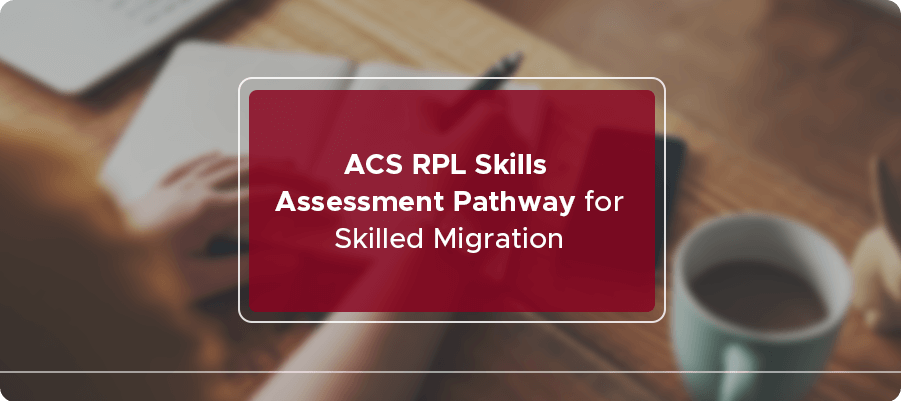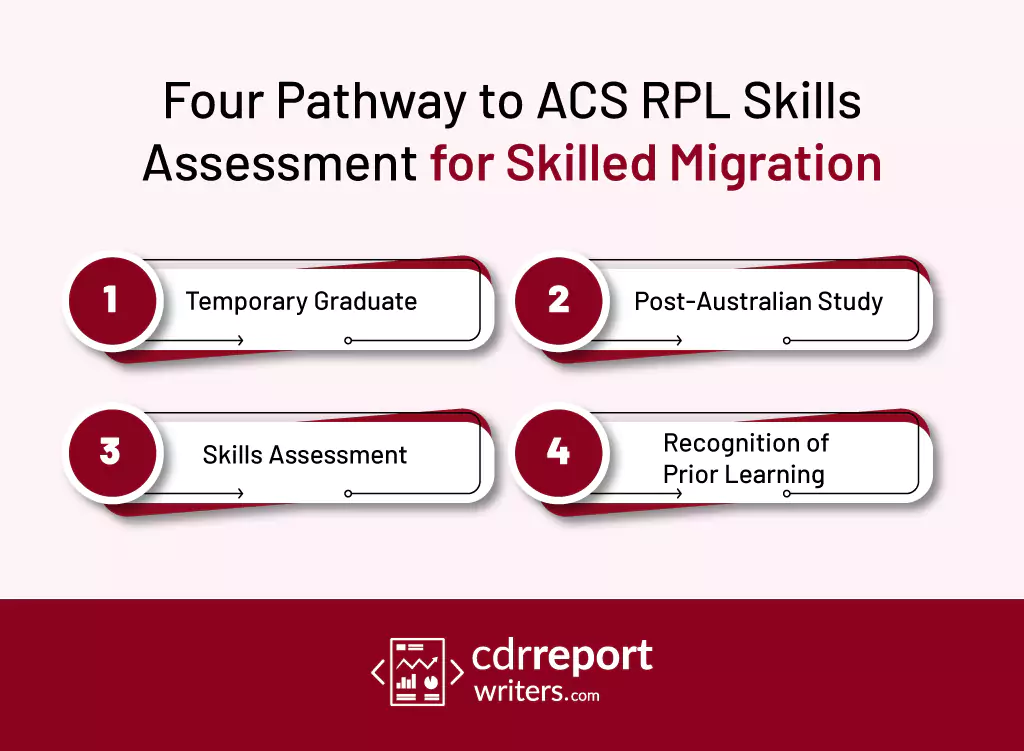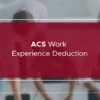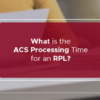
ACS RPL Skills Assessment Pathways for Skilled Migration
Australia is a favored destination for skilled migrants seeking to start a new chapter of their life in a country with great opportunities and a high standard of living. However, going through the ACS RPL Skills Assessment Pathway is crucial to migrating to Australia as a skilled worker.
ACS RPL stands for Australian Computer Society Recognition of Prior Learning. It is a skills assessment pathway designed for those who do not have a formal ICT qualification but have gained ICT skills and knowledge through practical experience. The ACS RPL Skills Assessment Pathway is necessary for those seeking migration to Australia under the Skilled Independent Visa or the Skilled Nominated Visa programs.
The Australian Computer Society (ACS) is the country’s official information and communication technology regulating body. ACS evaluates the knowledge, skills, and competence of potential migrant ICT professionals for employment in Australia’s nominated occupation. Australian Computer Society only assesses ICT professionals applying for Migration Skills Assessment.
Four Pathways to ACS RPL Skills Assessment for Skilled Migration
The Australian Computer Society (ACS) is the designated assessing authority for Information and Communication Technology (ICT) occupations for skilled migration to Australia. The ACS RPL Skills Assessment Pathway for Skilled Migration is a crucial step for skilled migrants who wish to work in Australia’s ICT industry.
There are four pathways available for the ACS RPL Skills Assessment, which include the Temporary Graduate (TG), Post-Australian Study (PAS), Skills Assessment, and Recognition of Prior Learning (RPL). Below we will describe each pathway in detail.

1. Temporary Graduate (TG) | ACS RPL Skills Assessment Pathway
Applicants with a bachelor’s degree or higher level from a prestigious Australian university can apply as temporary graduates (TG). Candidates may only take this qualification-only skill assessment pathway for a subclass 485 visa.
This pathway gets designed for international students who have recently completed an ICT-related degree or higher qualification in Australia. The applicant must have completed the qualification within the last two years and have an offer of employment in the ICT field.
There are no work experience requirements for this pathway. The applicant must submit a Project Report demonstrating their involvement in at least two ICT projects they have worked on in the previous days. The report must include details of the applicant’s role in the project, the project’s objectives, the methodology used, the technologies and tools employed, and the applicant’s contribution to the project’s success.
Suitability Criteria
- A Temporary Graduate track is appropriate for the nominated occupation specified in subclass 485 of the Medium and Long-Term Strategic Skills List (MLTSSL).
- An Australian bachelor’s degree or higher level with a major in ICT is required.
- For visa reasons, meet the Australian Study Requirement (ASR). Your Australian Study Requirement needs are not the responsibility of ACS. The Department of Home Affairs will take out this process.
Learn More: Pathways for Migration Skills Assessment ✏️✏️
2. Post-Australian Study (PAS) | ACS RPL Skills Assessment Pathway
This application method is for candidates who have finished their bachelor’s degree or higher-level study in Australia and want a skill assessment for migration purposes. The post-Australian study requires the completion of an Australian Computer Society (ACS) professional year program or another similar job in the ICT field.
This pathway is for international students who have completed an ICT-related degree or higher qualification in Australia in the last six months. The applicant must have an offer of employment in the ICT field, and there are no work experience requirements for this pathway.
The applicant must submit a Project Report demonstrating their involvement in at least two ICT projects they have worked on previously. The report must include details of the applicant’s role in the project, the project’s objectives, the methodology used, the technologies and tools employed, and the applicant’s contribution to the project’s success.
Suitability Criteria
- Bachelor’s degree or higher education level in Australia with a major in ICT in the selected field.
- After completing a comparable Australian degree or a professional year program, one year of work experience get required.
3. Skills Assessment | ACS RPL Skills Assessment Pathway
The skills Assessment application path is for tertiary ICT jobs and degrees subject to general skill evaluation. This pathway is for individuals with an ICT-related degree or higher qualification from a non-Australian institution.
The applicant must have at least two years of appropriate work experience in the ICT field within the past ten years. The applicant must submit a Project Report demonstrating their involvement in at least two ICT projects they have worked on previously.
The report must include details of the applicant’s role in the project, the project’s objectives, the methodology used, the technologies and tools employed, and the applicant’s contribution to the project’s success. Additionally, the applicant must pass a Key Areas of Knowledge (KAO) test, which assesses their knowledge of ICT concepts, principles, and practices.
Suitability Criteria
The qualification that is comparable to an AQF bachelor or higher degree with an ICT major
- To satisfy the criterion, you must have two years of relevant job experience performed within the last ten years or four years of related work experience at any time if your degree is an ICT major.
- To satisfy the criterion, you must complete four years of work experience at any time if your degree is in ICT and not closely connected to your employment.
The qualification that is comparable to an AQF bachelor or higher degree with an ICT minor
- To satisfy the criteria, you must have five years of related work experience accomplished in the last ten or six years of work experience completed at any time if your degree is an ICT minor and get directly connected to your employment.
- To satisfy the criterion, you must have six years of related work experience at any time if your degree is an ICT minor that doesn’t get connected to your employment.
The qualification that is comparable to vendor certification or AQF diploma
- To meet the criteria, you must have five years of related work experience completed in the previous ten or six years of work experience completed at any time if your vendor certification or AQF degree is an ICT major and is closely related to your occupation.
- Suppose your AQF degree or vendor certification is in ICT and not closely connected to your employment. In that case, you’ll need to complete six years of related work experience at any time to fulfill the requirements.
Learn More: Temporary Graduate Visa Subclass 485 ⏱⌛️
4. Recognition of Prior Learning (RPL) | ACS RPL Skills Assessment Pathway
The RPL application pathway is for candidates who do not have any ICT qualifications or who have insufficient or no ICT content.
This pathway is for individuals who have yet to complete an ICT-related degree or higher qualification but have at least five years of practical work experience in the ICT field within the past ten years. The applicant must submit a Project Report demonstrating their involvement in at least two ICT projects they have worked on.
The report must include details of the applicant’s role in the project, the project’s objectives, the methodology used, the technologies and tools employed, and the applicant’s contribution to the project’s success. Additionally, the applicant must pass a KAO test, which assesses their knowledge of ICT concepts, principles, and practices.
Suitability Criteria
Non-ICT qualification equivalent to AQF diploma or higher
To meet the suitability criteria, you must have six years of work experience completed within the previous year and an RPL application if your degree gets classified as insufficient ICT with an equivalent AQF Diploma or higher.
No tertiary qualification – work experience only
To fulfill the eligibility criteria, if you do not have a tertiary educational certificate, you must have completed eight years of work experience in the preceding year and submitted a Recognition of Prior Learning (RPL) application.
Learn More: Skilled Employer Sponsored Regional Visa (Subclass 494) 📖📖
Conclusion
The ACS RPL Skills Assessment Pathway is a rigorous process that assesses the skills and knowledge of skilled migrants who wish to work in Australia’s ICT industry. The pathway provides multiple options for international students, non-Australian degree holders, and experienced ICT professionals to demonstrate their ICT capabilities.
The Project Report is a critical component of the assessment process as it provides evidence of the applicant’s involvement in ICT projects and their contribution to the project’s success. The KAO test is also essential to the assessment process, as it evaluates the applicant’s theoretical knowledge of ICT concepts, principles, and practices.
It’s important to note that each pathway has specific requirements and eligibility criteria. Therefore, it’s essential for applicants to carefully review the conditions before selecting the appropriate path for their situation. Additionally, the ACS RPL Skills Assessment Pathway is only the first step toward skilled migration to Australia. Applicants may need to fulfill additional requirements based on their visa type and intended work in Australia.
Our professionals approach report writing appropriately and can help you write a flawless RPL report. The primary purpose of our RPL report writing is to assist with report writing at an affordable rate.
CDRReportWriters offers a team of competent writers for the preparation of your report. CDR report, ACS RPL report, KA02 report, Career episodes, Summary Statement, and many more types of writing and reviewing services are available at us. You can request an overview of our approved samples as a starting point. Get your report written by the best report writers in Australia.





